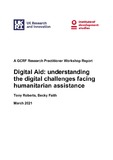Digital Aid: Understanding the Digital Challenges Facing Humanitarian Assistance
| dc.contributor.author | Roberts, Tony | |
| dc.contributor.author | Faith, Becky | |
| dc.coverage.spatial | Global | en |
| dc.date.accessioned | 2021-03-19T10:27:21Z | |
| dc.date.available | 2021-03-19T10:27:21Z | |
| dc.date.issued | 2021-03 | |
| dc.identifier.citation | Roberts, T. and Faith, B. (2021) Digital Aid: Understanding the Digital Challenges Facing Humanitarian Assistance, Brighton: Institute of Development Studies, DOI: 10.19088/IDS.2021.030 | en |
| dc.identifier.uri | https://opendocs.ids.ac.uk/opendocs/handle/20.500.12413/16484 | |
| dc.description.abstract | The UKRI Digital Aid workshop on 9 September 2019 brought together expert practitioners and researchers to focus on the use of digital technologies in humanitarian aid. Participants brought wide experience of digital applications to monitor conflict, refugees, food security, and to reunite families, enable communication and increase donor value for money. The event identified key areas where the rapid pace of technological change is outstripping our current understanding of emerging risks, digital inequalities and ethical dilemmas associated with the use of digital technologies in humanitarian response. The International Committee of the Red Cross (ICRC) in their contribution to the UN Secretary-General’s High-Level Panel on Digital Cooperation warned that it is of critical importance to ‘keep humanitarian purpose, and the people humanitarian organizations are there to protect and assist, firmly at the centre of any developments in order to ensure the humanitarian response do no harm in their application’ (ICRC 2019). Yet workshop discussions showed how humanitarian practitioners are struggling to operationalise the “do no harm” principle in the context of a rapidly changing technological landscape. Workshop participants felt that research has a vital role to play in protecting the interests of vulnerable communities in the digital age. | en |
| dc.description.sponsorship | UKRI | en |
| dc.language.iso | en | en |
| dc.publisher | Institute of Development Studies | en |
| dc.rights | This is an Open Access report distributed under the terms of the Creative Commons Attribution 4.0 International licence (CC BY), which permits unrestricted use, distribution, and reproduction in any medium, provided the original authors and source are credited and any modifications or adaptations are indicated. | en |
| dc.rights.uri | http://creativecommons.org/licenses/by/4.0/ | en |
| dc.subject | Development Policy | en |
| dc.subject | Rights | en |
| dc.subject | Technology | en |
| dc.title | Digital Aid: Understanding the Digital Challenges Facing Humanitarian Assistance | en |
| dc.type | Article | en |
| dc.rights.holder | Institute of Development Studies | en |
| dc.identifier.team | Digital | en |
| dc.identifier.doi | 10.19088/IDS.2021.030 | |
| dcterms.dateAccepted | 2021-03 | |
| rioxxterms.funder | Default funder | en |
| rioxxterms.identifier.project | Default project | en |
| rioxxterms.version | VoR | en |
| rioxxterms.versionofrecord | 10.19088/IDS.2021.030 | en |
| rioxxterms.funder.project | 9ce4e4dc-26e9-4d78-96e9-15e4dcac0642 | en |
Files in this item
This item appears in the following Collection(s)
-
IDS Research [1671]
Except where otherwise noted, this item's license is described as This is an Open Access report distributed under the terms of the Creative Commons Attribution 4.0 International licence (CC BY), which permits unrestricted use, distribution, and reproduction in any medium, provided the original authors and source are credited and any modifications or adaptations are indicated.


